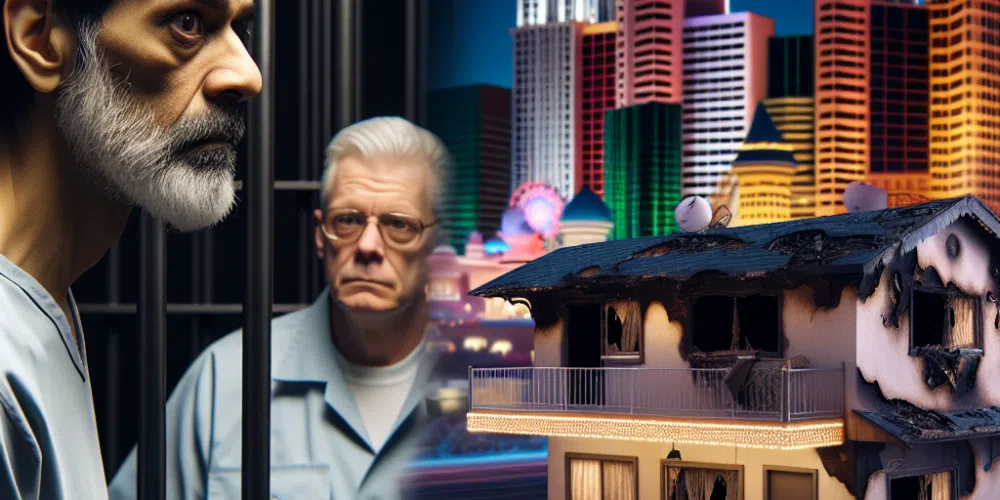Adolfo Orozco-Garcia, 49, the former owner of the Alpine Motel in Las Vegas, has turned himself in to serve his prison sentence following the tragic fire on December 21, 2019, which claimed the lives of six people. This devastating incident remains the deadliest fire within the city limits of Las Vegas.
Originally facing 27 charges related to the fire, Orozco-Garcia saw his legal journey take a significant turn in January. He chose to accept a plea deal, thereby circumventing a lengthy trial that was set for February. The plea involved an Alford plea, a legal move allowing him to maintain his innocence while acknowledging the prosecution’s evidence was likely strong enough to convict him. Under this deal, Orozco-Garcia pleaded guilty to two counts of involuntary manslaughter and one count of wanton disregard for safety resulting in substantial bodily harm or death. The agreement was a calculated decision to potentially reduce his sentence compared to a possible trial outcome.
In June, Clark County District Court Judge Jacqueline Bluth sentenced Orozco-Garcia to 19 to 48 months in prison. The judge allowed him 90 days to surrender voluntarily, which he did as his deadline approached. Under the terms of his sentence, he can apply for probation after serving the minimum 19 months, with the potential to serve a maximum of four years.
On that fateful day in December 2019, the fire erupted in the three-story Alpine Motel Apartments, a building with a troubled history of fire safety issues. Constructed in 1972, it repeatedly failed fire inspections and had numerous code enforcement complaints. The residents, some without functional heaters, reportedly used kitchen stoves for warmth, a dangerous practice that ignited the deadly fire. Among the victims were Donald Keith Bennett, 63; Tracy Ann Cihal, 57; Francis Lombardo Jr., 72; Cynthia Mikell, 61; Kerry Marie Odo-Baclaan, 46; and Henry Lawrence Pinc, 70. In addition to the fatalities, 13 individuals sustained injuries, and over 50 were rendered homeless.
While the tragedy of the Alpine Motel fire is significant, it’s part of a larger narrative about fire safety in the area. The broader Las Vegas region is no stranger to fire-related disasters. The infamous MGM Grand fire on November 21, 1980, remains etched in memory, even though it occurred outside the city’s official boundaries in the unincorporated Paradise area. That disaster at the MGM Grand Hotel and Casino caused the deaths of 85 people, primarily due to smoke inhalation, making it one of the deadliest fires in US history. The fire started from a refrigerated pastry display case in a restaurant on the first floor, with smoke rapidly spreading throughout the building.
Some observers argue that the plea deal Orozco-Garcia accepted was a pragmatic choice, weighing the certainty of a shorter sentence against the uncertainty of a trial by jury. Such decisions highlight how plea bargains can serve as a tool for both the defense and the prosecution to avoid the unpredictability of courtroom battles. The Alford plea, in particular, served as a strategic option for Orozco-Garcia, allowing him to acknowledge the strength of the evidence without admitting guilt. The case underscores ongoing discussions about the efficacy and ethical dimensions of plea bargaining in the criminal justice system.
However, critics might view the plea deal as an inadequate response to a case with such grave consequences. They could argue that the sentence does not fully reflect the severity of the negligence and its impact on the victims and their families. The tragedy of losing six lives and displacing dozens more may, in their view, demand a harsher penalty to serve as a deterrent for similar future incidents. Such perspectives emphasize the need for stringent enforcement of fire safety regulations and accountability for property owners who fail to ensure the safety of their tenants.
The aftermath of the Alpine Motel fire continues to resonate, prompting discussions about fire safety standards and the responsibility of property owners in safeguarding their residents. In a city like Las Vegas, where growth and development are constants, ensuring that buildings comply with safety codes is crucial to prevent future tragedies. The fire has been a painful reminder of the potentially catastrophic consequences of neglecting safety standards.
As Orozco-Garcia begins his prison sentence, the broader implications of the case remain. It serves as a somber reminder of the human cost of safety lapses and the importance of vigilance in fire prevention efforts. The tragedy also highlights the enduring impact of community loss and the necessity for systemic changes to protect lives. The victims and their families, forever marked by that December day, continue to seek closure and justice amid ongoing conversations about accountability and reform in fire safety practices.

Garry Sputnim is a seasoned journalist and storyteller with over a decade of experience in the trenches of global news. With a keen eye for uncovering stories that resonate, Alex has reported from over 30 countries, bringing light to untold narratives and the human faces behind the headlines. Specializing in investigative journalism, Garry has a knack for technology and social justice issues, weaving compelling narratives that bridge tech and humanity. Outside the newsroom, Garry is an avid rock climber and podcast host, exploring stories of resilience and innovation.
















